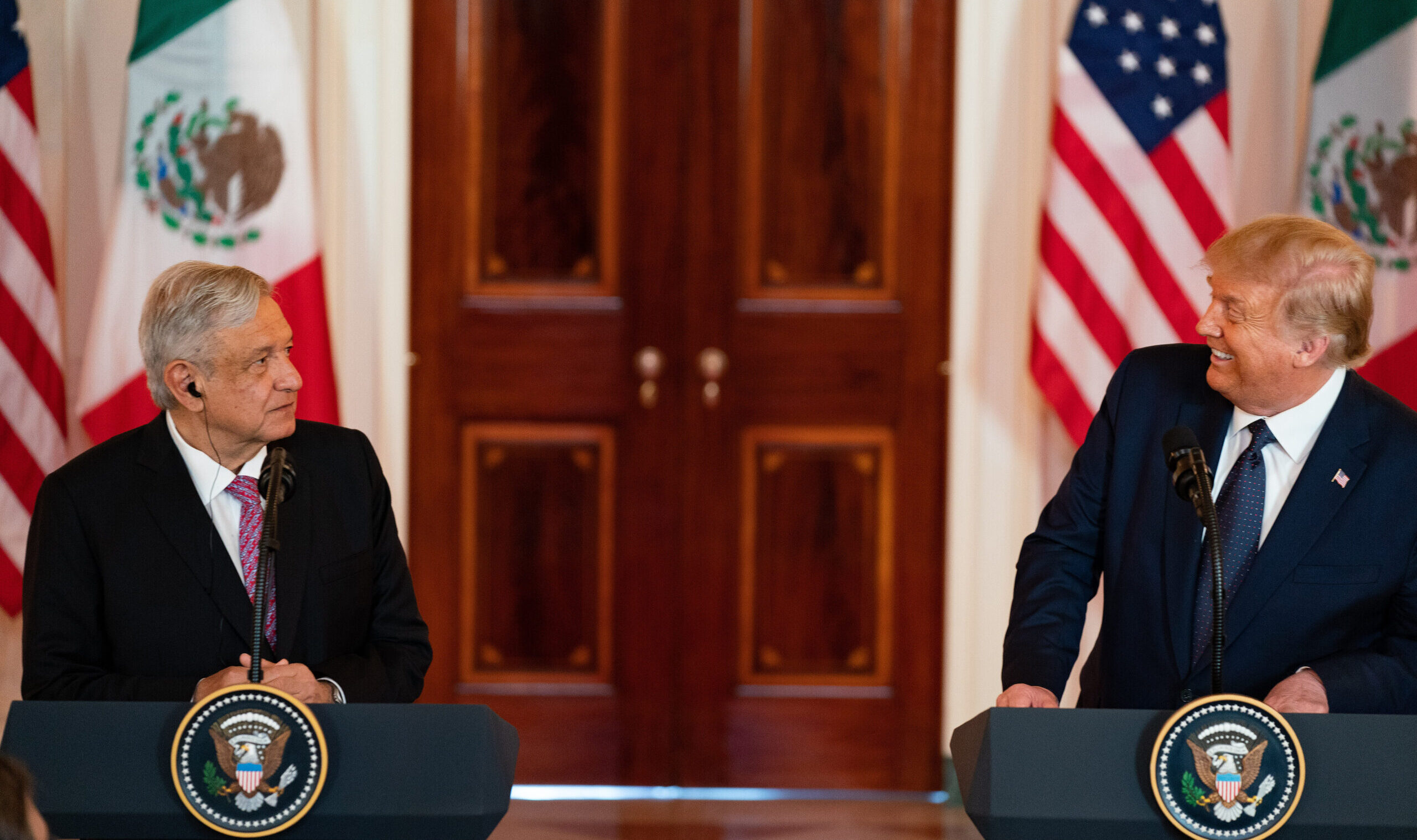Trump’s Surprising Friendship with Mexico
The president has been amigos with Mexican leaders since 2018.

When Trump took office in 2016, bad relations with Mexico seemed preordained. During the campaign, the president had lambasted the country for its role in facilitating illegal immigration to the U.S., famously saying that “When Mexico sends its people, they’re not sending their best…. They’re bringing drugs. They’re bringing crime. They’re rapists.” One of the signature planks of his campaign program was to build a wall on the southern border and “make Mexico pay for it.”
So it was no surprise that the newly-elected president got along poorly with Mexico’s then-President Enrique Peña Nieto. Peña Nieto largely avoided confronting Trump where possible, but the Mexican president’s perceived passivity made him massively unpopular among his countrymen. Eventually, Peña Nieto backed away from engaging with the U.S. entirely, cancelling meetings with the president multiple times over what was viewed in Mexico as unacceptably aggressive rhetoric.
When Peña Nieto’s term ended in 2018, however, a new political force swept Mexico. The boisterous left-wing populist Andrés Manuel López Obrador, popularly known as AMLO, seized control of the country in a landslide, winning every single Mexican state but one and beating his closest competitor by more than 30 percent. His electoral coalition, led by his own political party Morena, won majorities in both the Mexican Senate and Chamber of Deputies, granting him control over the entire Mexican federal government.
López Obrador campaigned on taking a more confrontational stance with the U.S., contrasting himself with the widely disliked Peña Nieto. During the run-up to the election, he spoke harshly against Trump specifically, saying that the president was running “a neofascist campaign of hate” and going so far as to reference him in comparison with Hitler. With his brash, aggressive style and unabashedly patriotic message, many commentators expected a clash of personalities across the U.S.–Mexico border.
What they got instead came to many commentators as a surprise. After taking office in December of 2018, López Obrador not only avoided confronting Trump, he became downright friendly with his American counterpart. In 2019, after Trump threatened to implement escalating tariffs on Mexican exports to the U.S. over illegal immigration and crime spilling over the southern border, López Obrador made an agreement with the U.S. that established the Remain in Mexico policy, where asylum applicants would wait in Mexico until they could be processed by courts rather than being released into the U.S. López Obrador also deployed the Mexican National Guard to turn back migrants and reduce immigration flows into the U.S. from outside Mexico.
The approach, unexpected as it was, worked well for López Obrador. By the end of 2019, Trump was calling López Obrador “a man who I like and respect” and had largely put aside his more extreme demands on the Mexican government, including the demand for Mexico to pay for the U.S. border wall. In 2020, López Obrador made his first trip outside the country—to meet with Donald Trump in Washington, DC. There, the Mexican president praised Trump and said that he had “not attempted to treat our country like a colony, but on the contrary has honored our condition as an independent nation… [President Trump] has behaved with respect and courtesy towards us.” Trump, in response, said that it was “a profound privilege to have [López Obrador] as my friend” and called Mexicans “wonderful people.”
The surprising friendship between the two populists from opposite sides of the border and the political spectrum raised eyebrows in both the U.S. and in Mexico. In the U.S., liberals like those at the New York Times deplored what they considered Mexico’s inhumane efforts to tamp down on illegal immigration resulting from Trump and López Obrador’s 2019 agreement. In Mexico, it provoked bitter accusations that López Obrador was selling out to Trump. But whatever the reason for the accord between the two presidents—whether it was a result of hard political calculation, or simply the mutual respect and understanding arising from similarities in temperament and political style—the relationship was quite successful. López Obrador avoided the destructive economic penalties threatened by Trump, successfully implemented the USMCA free trade agreement, and even convinced Trump to help bail out Mexico’s struggling oil industry in 2020. By the end of his first term in 2020, Trump, on the other hand, significantly reduced illegal immigration with the help of Mexican troops and the Remain in Mexico asylum policy.
Trump’s return to office in 2024 presented another challenge for the U.S.-Mexico relationship. López Obrador’s six-year term ended in 2024, and—leaving office an immensely popular president—he turned the reins of his political movement over to Claudia Sheinbaum, an early supporter who at the time served as the head of the government of Mexico City. There was considerable speculation that Sheinbaum, unlike her predecessor, would not get along well with Trump.
There was good reason to be skeptical. Sheinbaum is in many ways a sharp contrast to López Obrador. Where López Obrador is a bombastic populist, prone to provocation and rhetorical aggression, Sheinbaum’s political style is calm, quiet, and analytical. López Obrador preferred to paint in broad ideological strokes; Sheinbaum speaks readily the language of technocracy and policy. López Obrador comes from a poor, rural, indigenous background in southern Mexico; Sheinbaum is a secular Mexican Jew whose parents were academics in urban Mexico City. López Obrador’s political program was heterodox and focused on economic uplift; Sheinbaum made a name for herself as something of a culture warrior, supporting feminist initiatives and controversially dismantling a statue of Columbus during her term as head of government in the capital as part of a “decolonization” project. Would someone of her ideological bent really be cooperative with Donald Trump?
As it turns out, the answer is yes. López Obrador may have chosen a politician very different from himself to succeed him in wearing the banda presidencial of Mexico, but he left the country in hands no less adept at managing Mexico’s relationship with the U.S. Sheinbaum, like López Obrador, is well aware that Mexico’s well-being depends on its economic integration with the U.S. She has taken the opportunity to show her quality as an immensely talented diplomat and politician, balancing American demands laid out by Trump on matters ranging from immigration to trade with the domestic political requirement to maintain a strict sense of political sovereignty and independence from American influence.
One of Trump’s first moves during his second term was to begin threatening Mexico with major tariffs if the Mexican government did not crack down on controlling immigration and drug trafficking across the border. As in 2016, immigration and crime were major themes in his electoral victory in 2024, and just as in his previous term, leveraging economic threats promised to be a quick and simple way to address one of Trump’s major priorities. The threats were taken badly by the Mexican people, who have always resented American interference in their domestic politics, and there was pressure for Sheinbaum to impose retaliatory tariffs. Instead, like López Obrador before her, she struck a deal to clamp down on the border with the National Guard—something that cost Mexico little, as the country already had an agreement in place with the Biden administration that was laid out on much the same lines. The result was pleasing for both parties: Trump got to declare that Mexico had bent the knee and would be working on reducing crime and immigration across the border, while Sheinbaum was able to inform her domestic audience that she had held the line and not granted further concessions in the face of Trump’s tariff threats.
For many politicians, this would have been enough, but Sheinbaum has made it clear that not only is she willing to strike deals with Trump, she’s willing to actively work with the U.S. on Trump’s major priorities. After announcing the deal, Sheinbaum has worked hard to demonstrate Mexico’s efforts to increase border security, dramatically increasing arrests and the seizure of drugs heading for the U.S. She even took the unprecedented step of extraditing 29 drug kingpins from Mexican prisons to face justice before American tribunals, and it is suspected that perhaps 40 more will be handed over and placed in American custody in the coming weeks.
Indeed, in the face of every tariff threat and Trumpian menace, Sheinbaum has been characteristically level-headed, courteous, and cooperative. Even where tariffs have been imposed, as in the case of steel, aluminum, and motor vehicles, she has taken the route of negotiation, sending her secretary of the economy, Marcelo Ebrard, to Washington to try to work out more favorable terms. As a result, the U.S. and Mexico have had a strong working relationship during Trump’s second term: Mexico has avoided both punitive tariffs and the reciprocal tariffs imposed by Trump on Liberation Day, placing it in a relatively advantageous position for investors and companies looking to retool their supply chains.
Trump, for his part, seems to recognize that Sheinbaum is a good negotiating partner and an impressive politician. “President Sheinbaum is a terrific person, a fantastic woman,” he said on Thursday. “We’ve had many conversations. She is a very elegant—and just a fantastic person.”
The post Trump’s Surprising Friendship with Mexico appeared first on The American Conservative.

